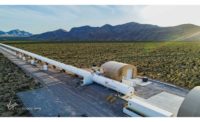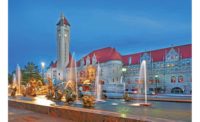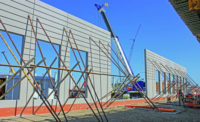The Missouri Hyperloop Coalition—a public-private partnership that includes the Missouri Dept. of Transportation, the University of Missouri and other public stakeholders—announced on Jan. 30 an agreement to produce a feasibility study for a 248-mile hyperloop route, connecting Kansas City, Columbia, Mo., and St. Louis.
Virgin Hyperloop One would construct and operate the proposed route, which is sited in the Interstate 70 corridor. The drive between St. Louis and Kansas City now takes roughly three hours and 40 minutes. Hyperloop One says it can cut that trip down to about 31 minutes. Overland Park, Kansas, engineering firm Black & Veatch, in partnership with Virgin Hyperloop One and the University of Missouri, will conduct the feasibility study. A hyperloop is a sealed tube or system of tubes through which passengers or objects can travel in a pod at a high speed, free of air resistance or friction.
The feasibility study will take up to nine months to complete, according to David Leligdon, vice president at Black & Veatch. The report will use electronic, drone and boots-on-the-ground data to examine the proposed route. Leligdon says Black & Veatch will provide other options for the route.
“Starting out with the 1-70 corridors certainly provides some advantages as far as information,” Leligdon says. “The high speed and the nature of maximizing a straight alignment, while looking at overall constructibility and environmental impact, will provide some challenges that need to be addressed. [Dealing] with that overall corridor is a good starting point.”
MoDOT is providing data on both potential cargo and passenger transportation to coalition partners Black & Veatch and Virgin Hyperloop One. The data show that, every year, the I-70 corridor carries more than 31.5 million tons of freight, valued at more than $59 billion.
To ease that burden, the feasibility study will create a cost estimate for the proposed hyperloop’s design and construction, but stakeholders are not yet commenting on what the cost might be for the project, which would require federal approval.
“[The cost estimate] is something we really do have to iterate on and figure out in the feasibility study,” says Dan Katz, Virgin Hyperloop One’s director of public policy. “We do believe, if you look at our system, it comes out [to be] less expensive than high-speed rail.”






Post a comment to this article
Report Abusive Comment